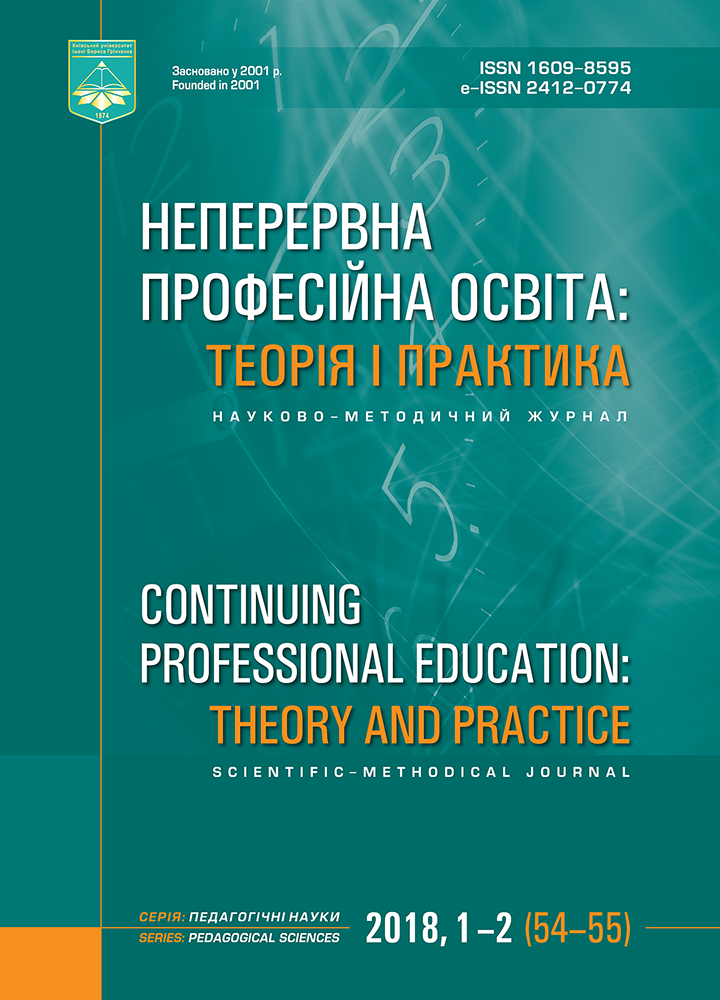ASSESSMENT IN HIGHER EDUCATION: CRITERIA AND EFFICIENCY INDICATORS
DOI:
https://doi.org/10.28925/1609-8595.2018(1-2)121130Keywords:
assessment, accreditation, criteria, indicator (simple, performance, efficiency), evaluation, higher education, licensing.Abstract
The ongoing implementation of the Bologna Process in Europe prompts comparisons with international competitors and efforts to match their quality assurance standards. Higher education institutions must be effective to succeed in research, to provide best academic practices and high quality of studies. Terminological system of pedagogical science and practice of higher education reflects the goals, values and problems, structure and system of scientific knowledge of the XXI century. The process for content analysis is designed to achieve the objective analysis possible by defining the process of the qualities and characteristics to be measured in HE. The article provides definitions of basic concepts that describe the features of tools for measuring and assessing in higher education. A comparative analysis of the practice of applying criteria & indicators is made on materials of English-language publications. Starting from a conceptual discussion around commonly used terms, such as, «criterion» and «indicator», the author has shown that these terms do not have a single universal meaning. The analysis shows that there is no common understanding of what criteria-based means or what it implies for practice. Instead, they belong to a wide conceptual field, which covers various overlapping or closely related topics. This paper addresses the nature of the concept of criteria in relation to higher education. This paper provides examples of use different sets of criteria for the accreditation and external evaluation of Higher education institutions and study programmes in Bosnia and Herzegovina, recognised by the EU as a «potential candidate country». In accordance with the constitutional structure of BiH, there are several regulations for external QA which are combined for each accreditation procedure. The project «Strengthening Institutional Capacity for Quality Assurance» (2013-2015) aims to support the full implementation of the ESG at all levels and to carry out accreditations of all HEIs in the country. In the process of analyzing the institutional practice of the country the problem of harmonizing national criteria with updated ESG2015 for licensing, conducting accreditation of higher education institutions and educational programs has been raised. The author analyses ways of thinking about the practice of applying the indicators for the sphere of higher education. It is stated, that the concepts of «effectiveness» and «efficiency» are often confused. The peculiarities of using the indicator panels (OECD, World Bank, European Union) are described for measuring the quality at the level of the education systemReferences
Caldwell, M. E. (1992). Quality in Higher Education: A Theoretical Study. Educational Research Journal, 7, 50–59 (eng).
Church, C. H. (1988). The qualities of validation. Studies in Higher Education, 13, 27–43 (eng).
Crozier, F., et al. (2006). Terminology of quality assurance: towards shared European values? Helsinki, Finland: European Association for Quality Assurance in Higher Education (eng).
Gover, A., Loukkola, T. (2015). EUREQA moments! Top tips for internal quality assurance. European University Association. Retrieved from www.eua.be (eng).
Decision on Criteria for Accreditation of Higher Education Institutions in Bosnia and
Herzegovina (2010). Official Gazette of BiH, 75/10 and 44/13. Retrieved from http:// hea.gov.ba/Dokumenti/u-pripremi/Criteria%20eng.pdf (eng).
ENQA Agency review: Agency for development of higher education and quality assurance of Bosnia and Herzegovina (HEA) (2017). Retrieved from http://www.enqa.eu/wp-content/uploads/2017/09/HEA-ERR_FINAL.pdf (eng).
European Commission (June 2002). Quality indicators of lifelong learning: Fifteen quality indicators. Brussels, Belgium: European Commission. Retrieved from http://www.aic.lv/bolona/Bologna/contrib/EU/report_qual%20LLL.pdf (eng).
European Parliament Committies (2015). University quality indicators: A critical assessment. Study. doi:10.2861/426164 QA-02-15-583-EN-N141 (eng). Retrieved from http://www.europarl.europa.eu/committees/en/supporting-analyses-search.html
European Parliament’s Committee on Education and Culture (2016). Evaluation of Education at the European Level. Research for CULT Committee. Retrieved from http://www.europarl.europa.eu/thinktank/en/search.html?keywords=000671 (eng).
Framework Law on Higher Education in Bosnia and Herzegovina (2007). Brussels, Belgium. The Official Gazette of Bosnia and Herzegovina, 57/07 and 57/09. Retrieved from https://yeungus.com/framework-law-on-higher-education-in-bosnia-and-herzegovina-free-related-pdf.html (eng).
Harvey, L. and Green, D. (1993). Defining Quality. Assessment & Evaluation in Higher Education, 18: 1, 9–34. doi: 10.1080/0260293930180102. Retrieved from http://dx.doi.org/10.1080/0260293930180102 (eng).
Ćurković, B. et al. (Eds). HIGHER Education and Quality Assurance. HEA documents (2012). Banjaluka, Bosnia and Herzegovina: Agency for Development of Higher Education Quality Assurance (eng).
HEA’s appeal to ENQA and decision on HEA’s membership in ENQA (2018). ENQA Secretariat. Retrieved from http://www.enqa.eu/wp- content/uploads / (eng).
Higher Education Funding Council for England (1999). Performance Indicators in Higher Education in the UK. London, Great Britain: HEFCE Report (eng).
ISO 9000:2015. Quality management systems – Fundamentals and vocabulary. Retrieved from https://www.iso.org/obp/ui/#iso:std:iso:9000:ed-4:v1:en (eng).
Muhamedbegovic, B., Dzanic, E., Dedic, E. (2016). New Standards and guidelines for quality assurance in the European Higher Education Area – Unifying impetus for advancements. Retrieved from http://ssrn.com/abstract=2721582 (eng).
OECD (2017). Education at a Glance 2017: OECD Indicators. Paris, France: OECD Publishing. Retrieved from http://dx.doi.org/10.1787/eag-2017-en (eng).
Overview of the Higher Education System. Bosnia and Herzegovina (2017). Retrieved from https://eacea.ec.europa.eu/sites/eacea- site/files/countryfiche_bosniaherzegovina_2017.pdf (eng).
Recommendations on criteria for licensing of higher education institutions and study programs in Bosnia and Herzegovina (2012). The Official Gazette of BiH, 13/12. Retrieved from http://www.hea.gov.ba/Dokumenti/dokumenti_agencije/?id=3323 (eng).
Sadler, D. R. (2005). Interpretations of criteria-based assessment and grading in higher education. Assessment & Evaluation in Higher Education, Vol. 30, Issue 2, 175–194 (eng).
Self-assessment report (2017). Banja Luka, Bosnia and Herzegovina: Agency for Development of Higher Education and Quality Assurance BiH (eng).
Standards and guidelines for quality assurance in Bosnia and Herzegovina (2007). The Official Gazette of Bosnia and Herzegovina, 13/08 (eng).
UNESCO Higher Education Indicators Study (2001). Accountability and International Co-operation in the Renewal of Higher Education. Retrieved from http://unesdoc.unesco.org/images/0012/001206/120630e.pdf (eng).
Vlăsceanu, L., Grünberg, L., Pârlea, D. (2007). Quality Assurance and Accreditation: A Glossary of Basic Terms and Definitions. Bucharest, Romania: UNESCO-CEPES (eng).
Vodič za internu i eksternu evaluaciju visokoškolskih ustanova u Bosni i Hercegovini (2015). World University Service of Bosnia Herzegovina (SUSBiH). Retrieved from http: //hea.gov.ba/projekti/sus/Vodic-za-internu-i-eksternu-evaluaciju-visokoskolskihustanova_bs.pdf (bosn).
World Bank (2008). The road not traveled education reform in the Middle East and North Africa. Washington DC, USA: World Bank (eng).
Downloads
How to Cite
Issue
Section
License
Copyright (c) 2020 Iryna Sokolova

This work is licensed under a Creative Commons Attribution-NonCommercial 3.0 Unported License.



